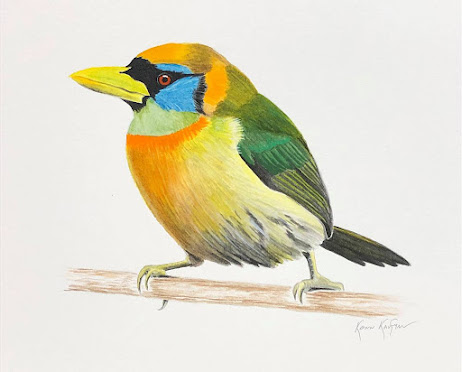Siskin Attack!
From Oak Harbor, Ohio, Kenn writes: I heard it this morning, high overhead, a sound that I'd been waiting for. Distant but unmistakable, a mix of querulous rising notes and dry rattles. Scanning the sky, I picked up a flock of half a dozen small, short-tailed birds, in high, bounding flight. Yes, they were Pine Siskins, all right.
Every fall, birders over much of the U.S. and Canada keep an ear toward the sky, listening for the calls of "winter finches" flying overhead. The "winter finches" are a group of about nine species that nest in the far north or in high mountains and that are mostly vegetarian in their diet: they eat seeds, buds, berries, but relatively few insects, unlike most other songbirds. These "winter finches" are extremely variable in their winter distribution. If there's a good supply of food in their nesting range -- a good cone crop on the spruces, for example, or lots of seeds on the birches -- the finches may stay in the Arctic all winter. But if wild food crops fail in the far north, the finches may invade far to the south. Depending on the season, other northerners may move as well: Bohemian Waxwings, Red-breasted Nuthatches, various northern owls. No two winters bring exactly the same mix of birds, and birders living south of the boreal forest always wait with anticipation to see which of these winter invaders will make an appearance.
Pine Siskin is a member in good standing in the "winter finch" group. A few siskins come south every fall, but some years there are huge numbers of them. It looks like this might turn out to be such a year. Just within the last few days, we've had reports of Pine Siskins suddenly showing up all over southern Ontario, southern Michigan, northern Ohio. These birds over Oak Harbor this morning may be part of a major flight. We should know for sure within the next few weeks.
Every fall, birders over much of the U.S. and Canada keep an ear toward the sky, listening for the calls of "winter finches" flying overhead. The "winter finches" are a group of about nine species that nest in the far north or in high mountains and that are mostly vegetarian in their diet: they eat seeds, buds, berries, but relatively few insects, unlike most other songbirds. These "winter finches" are extremely variable in their winter distribution. If there's a good supply of food in their nesting range -- a good cone crop on the spruces, for example, or lots of seeds on the birches -- the finches may stay in the Arctic all winter. But if wild food crops fail in the far north, the finches may invade far to the south. Depending on the season, other northerners may move as well: Bohemian Waxwings, Red-breasted Nuthatches, various northern owls. No two winters bring exactly the same mix of birds, and birders living south of the boreal forest always wait with anticipation to see which of these winter invaders will make an appearance.
Pine Siskin is a member in good standing in the "winter finch" group. A few siskins come south every fall, but some years there are huge numbers of them. It looks like this might turn out to be such a year. Just within the last few days, we've had reports of Pine Siskins suddenly showing up all over southern Ontario, southern Michigan, northern Ohio. These birds over Oak Harbor this morning may be part of a major flight. We should know for sure within the next few weeks.



Comments
Post a Comment